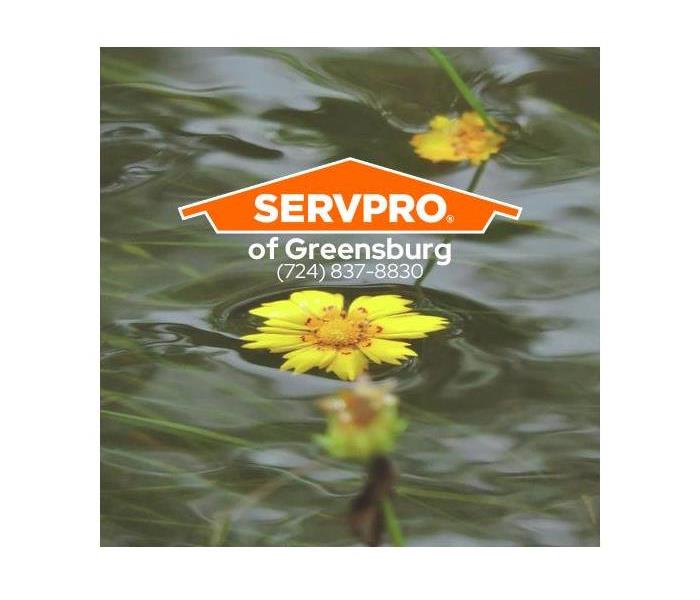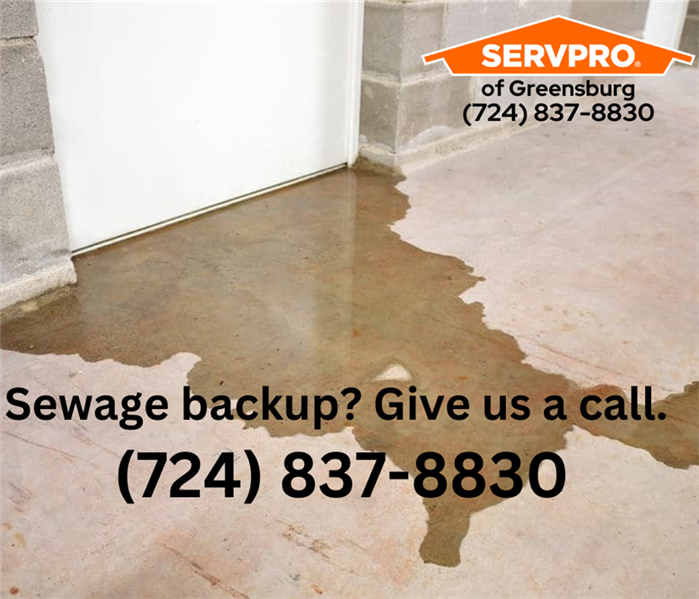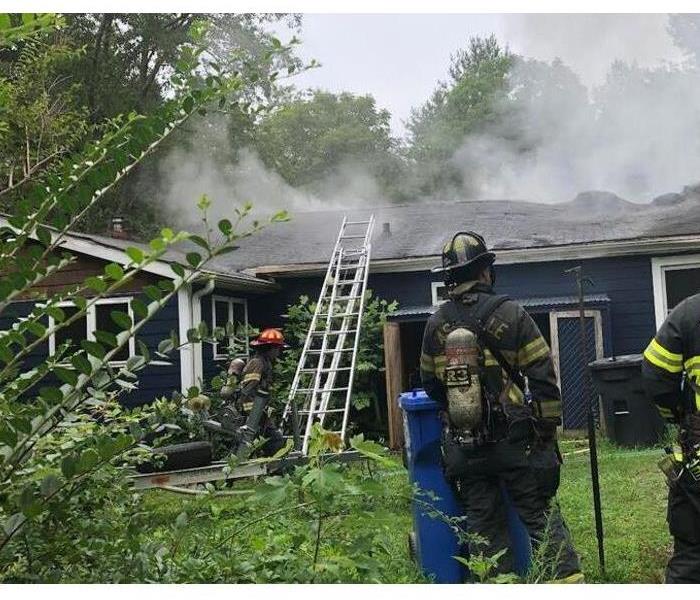Recent Posts
Are You Prepared For Forest Fires?
8/1/2024 (Permalink)
8/1/2024
You can expect to see sunshine and hot temperatures around this time of the year, but as you may have noticed, most of North America is experiencing abnormally high temperatures. While the weather has been lovely, with sunny skies and minimal rain, wildfires can quickly become a cause for concern. Dry weather like this can create perfect conditions for forest fires, especially in heavily wooded areas like Western Pennsylvania. Here are some essential tips to protect your home from forest fires :
1. Create a Defensible Space:
-Clear vegetation and flammable materials, such as dry leaves and fallen branches, within at least 30 feet of your house.
-Trim tree branches that overhang the roof and maintain a safe distance between trees and shrubs to prevent the rapid spread of flames.
2. Maintain a Clean and Debris-Free Environment:
-Regularly clean your property by removing dry leaves, pine needles, and other debris that can accumulate in gutters, roofs, and decks.
-Keep a safe distance between firewood stacks and your home.
3. Maintain an Emergency Water Supply:
-Ensure you have an emergency water supply readily available on your property.
-Create a firebreak by installing fire hoses around your home, and regularly inspect and test their functionality.
-Consider having a water storage tank or a swimming pool that can serve as an additional water source for firefighters or for protecting your property in case of a fire.
4. Develop an Evacuation Plan:
-Identify multiple escape routes and establish a meeting point away from the danger zone.
-Pack essential documents, medications, and supplies in an easily accessible emergency kit.
5. Stay Informed:
-Stay informed about the current fire conditions and follow the guidelines provided by local authorities.
-Sign up for emergency alerts and notifications through your local fire department or relevant agencies.
-Familiarize yourself with evacuation orders and be prepared to act swiftly if necessary.
Forest fires are dangerous, and it is imperative to remain prepared. If your Westmoreland County home is affected by fire or smoke damage, call SERVPRO of Greensburg. We’ll help make your disaster feel “Like it never even happened.”®
Preventing Water Damage
8/1/2024 (Permalink)
When heavy rains roll through Westmoreland County, we often see an influx of calls about water damage. Whether it be long-term issues such as window leaks or sudden damage like a flood, here are some ways to help prevent water damage from storms.
Clean out gutters yearly. Clearing out your gutters regularly is an extremely effective way to reduce your chances of water damage. If you let debris build up, you are putting yourself at risk of a gutter leaking into your home.
Check the seal on windows and doors. Check the seals every year for any wear and tear. This will help ensure that your windows and doors won’t leave you with soggy wood or drywall when it rains.
Ensure proper drainage around your foundation. Even foundations made out of cinder blocks or bricks can be vulnerable to water damage if the landscaping of your lawn allows water to pool up around the edges and seep into the building materials. Installing a french drain can help alleviate any unwanted water seeping into your home.
Inspect your roof. Small holes can develop in your roof, which can let water run into your home. Ensure you are monitoring your attic space and roof to prevent any water damage.
Install and maintain a sump pump. Installing and maintaining a sump pump is beneficial to protecting your home by helping to prevent overflows in your basement.
Rain can cause many different forms of water damage. Maintaining your home is the most important thing you can do to help prevent water damage. If these tips don’t prevent water damage in your home, call SERVPRO® of Greensburg! We are always Here to Help® with your water disaster needs!
Water Damage Timeline. What is it?
8/1/2024 (Permalink)
8/1/2024
Water damages are incredibly unpredictable, striking when you least expect it. Whether it is severe weather or leaking pipes, SERVPRO of Greensburg understands the stress and inconvenience of damage to your home or business. Water damages progress rapidly, causing an excessive loss in a short window of time. While we are open and always prepared to respond to these losses 24 hours a day, seven days a week, we believe that it is essential for YOU to understand how water damages work, and the timeline they generally follow when left untreated. Doing so will allow us to help you successfully mitigate, remediate, and salvage as much of your precious belongings as we can.
Water Damage Timeline
Within Minutes:
- Water spreads throughout the property, both in visible and non-visible cavities.
- Water is absorbed into drywall, flooring, and furniture.
- Furniture finishes may bleed, causing staining on surrounding carpets.
- Paper documents, photographs, and books absorb water and begin to swell.
Within 24 Hours:
- Drywall begins to swell and break down.
- Metal surfaces begin to tarnish.
- Odor begins to develop.
- Furniture may begin to swell and warp.
48 Hours to One Week:
- Microbial growth begins and may start spreading.
- Doors, windows, and studs begin to swell and warp.
- Metal begins to rust.
- Paint will begin to blister.
- Conditions can become hazardous for occupancy.
Greater than One Week:
- Structural safety is compromised.
- Microbial growth intensifies.
- Occupancy can be extremely unsafe.
- Cleanup and Restoration costs increase dramatically.
The longer the water sits, the more damage it will cause. That's why it is crucial to call the team that is faster to any size disaster: SERVPRO of Greensburg! Our teams of highly skilled technicians are always Here to Help®
Protecting Your Haven: A Comprehensive Guide to Preventing Water Damage at Home and Business
8/29/2023 (Permalink)
 SERVPRO is always Here to Help®.
SERVPRO is always Here to Help®.
Whether you're a homeowner or a business owner, water damage can wreak havoc on your property, leading to costly repairs, health hazards, and the disruption of your daily life or business. Check out the preventive measures below to see how you can protect your home or business.
- Regularly Inspect and Maintain Appliances:
Appliances are often the source of water-related mishaps. Routine checks and maintenance can prevent potential issues:
Washing Machines: Examine hoses for cracks or leaks and replace them every five years. Ensure the machine is level to prevent overflow. Leave space between the machine and the wall to avoid kinks in the hoses.
-Dishwashers: Inspect the supply and drainage lines for leaks or blockages. Ensure the door seal is intact, and clean the filter regularly to prevent clogs.
-Refrigerators: Check the water line for the ice maker and refrigerator. Replace if damaged. Position the fridge away from the walls to avoid damaging said line.
-Water Heaters: Inspect the tank and connections for leaks. Drain the tank annually to prevent sediment buildup.
- Maintain Roof and Gutters:
A well-maintained roof and gutters are your first line of defense against water damage:
-Roof: Regularly inspect for missing or damaged shingles. Look for signs of water or leaks in the attic.
-Gutters: Clean gutters and downspouts regularly to prevent clogs that can lead to overflowing water. Ensure they are securely attached and direct water away from the foundation.
- Proper Landscaping:
-Landscaping can impact water flow and drainage around your property:
-Grading: Ensure the ground slopes away from your property's foundation to prevent water from pooling around it.
-Planting: Avoid planting trees with invasive roots near water lines or your foundation, as they can damage these structures.
- Install a Sump Pump:
For properties prone to flooding, install a sump pump in the basement or crawl space. Sump pumps can prevent water damage by pumping out extra water.
- Sealing and Insulation:
Proper sealing and insulation can help prevent water infiltration:
-Windows and Doors: Check for gaps or cracks and apply weather stripping or caulking as needed.
-Foundation: Seal any visible cracks in the foundation to prevent water seepage.
- Swift Repairs:
Don't delay repairs when you notice water-related issues:
-Leaks: Address leaks promptly, whether a dripping faucet or a small roof leak. Small problems can escalate quickly if left untreated.
-Cracks: If you notice cracks in walls, ceilings, or the foundation, investigate and repair them to prevent water seepage.
- Educate Residents or Employees:
Whether it's your family or your employees, everyone should be aware of water damage prevention:
-Emergency Procedures: Teach everyone how to shut off the water supply in case of a leak or burst pipe.
-Reporting: Encourage open communication about leaks or water-related issues so they can be addressed promptly.
Water damage prevention is a responsibility that both homeowners and business owners share. You can significantly reduce the risk of water damage by performing regular checks on appliances, maintaining your roof and gutters, ensuring proper landscaping, and taking quick action on repairs. If you experience water damage in your property, call SERVPRO of Greensburg. We are always Here to Help®.
Flood Coverage... Do You Need It?
8/8/2023 (Permalink)
 When flooding wreaks havoc on your home, call SERVPRO!
When flooding wreaks havoc on your home, call SERVPRO!
Two insurance policies deal with a homeowner's damage due to water -- a flood insurance policy and a homeowners insurance policy. Losses not covered by one of these policies may be covered by the other. Understanding how your home may be affected by water can help you decide whether you need one or both policies. While insurance policies may differ in the coverage provided from homeowner to homeowner, some basic features are common to all policies. Be sure to ask your insurance agent or insurance company about the specifics of your insurance policy. In the meantime, the Insurance Information Network of California offers the following general information based on standard insurance policies.
Flood Insurance
As the name implies, a standard flood insurance policy written by the National Flood Insurance Program provides coverage up to the policy limit for damage caused by a flood. The dictionary defines "flood" as the rising and overflowing of a body of water onto normally dry land. For insurance purposes, the word "rising" in this definition is the key to distinguishing flood damage from water damage. Generally, damage caused by water on the ground at some point before damaging your home is considered flood damage. A handful of examples of flood damage include:
- A nearby river overflows and washes into your home.
- Heavy rain seeps into your basement because the soil can't absorb the water quickly enough.
- A heavy rain or flash flood causes the hill behind your house to collapse into a mud slide that oozes into your home.
The only way to insure flood damage is with a flood insurance policy -- no other insurance will cover flood damage. Flood insurance is available through your insurance agent, insurance company, or local Federal Emergency Management Office (FEMA). Contact your county planning office to determine if your home is in a flood plain. If you reside in a flood plain, flood insurance may be an excellent option to protect your home.
Homeowners Insurance
A homeowners insurance policy will not provide flood damage coverage, but it does provide many types of water damage coverage. When water causes significant damage to your home before it comes in contact with the ground, your homeowner's insurance policy may cover the cost of mitigation and repairs. A few examples of water damage include:
- A hailstorm smashes your window, permitting hail and rain-free access into your home.
- Heavy rain soaks through the roof, allowing water to drip through your attic or ceiling.
- A broken water pipe spews water into your home.
Your homeowner's insurance policy may not cover flood or water damage, but if a water or flood loss leads to other losses, such as theft or fire damage, your policy may cover it. For example, if a nearby creek overflows and floods your home, and looters steal some of your furnishings after you evacuate, the theft would be covered by your homeowner's insurance because it is a result of the water damage. However, the flood damage is only covered if you have flood insurance.
When dealing with water or flood damage, always contact your insurance provider for policy details, then call SERVPRO®. We are always Here to Help® with your fire and water disaster needs!
Have You Ever Had a Sewage Backup?
4/20/2023 (Permalink)
 If left untreated, sewage backups can damage multiple rooms in your home or business.
If left untreated, sewage backups can damage multiple rooms in your home or business.
They stink... Literally...
As a property owner, it's essential to understand the potential causes of sewage backups and how to prevent them. Sewage backups can cause significant damage to your property, and they can also pose health risks to you and your family.
Understanding the most common causes of sewage backups can help you prevent damage before it happens:
- Clogged Pipes: One of the most common causes of sewage backups is clogged pipes. Over time, debris such as grease, soap, and hair can accumulate in your pipes, eventually causing a blockage that prevents sewage from flowing through.
- Tree Roots: Tree roots can invade your sewer line through small cracks or joints, causing blockages and backups. If you have trees growing near your sewer line, it's essential to have them inspected regularly to ensure they're not causing any damage.
- Broken or Collapsed Pipes: Older homes may have pipes that are made from materials such as clay or cast iron that can break or collapse over time, causing backups. If you have an older home, it's essential to have your sewer line inspected periodically to identify any potential issues.
- Heavy Rainfall: Heavy rainfall can overwhelm your sewer system, causing sewage to back up into your home. If you live in an area that experiences heavy rainfall, consider installing a backwater valve to prevent sewage from flowing back into your home.
To prevent sewage backups, here are some tips you can follow:
- Avoid flushing anything other than toilet paper down your toilet.
- Dispose of cooking grease and oil properly.
- Install a strainer in your sink to prevent food scraps and other debris from going down the drain.
- Have your sewer line inspected periodically to identify any potential issues.
- Consider installing a backwater valve if you live in an area that experiences heavy rainfall.
If you do experience a sewage backup, it's essential to act quickly. Turn off your water supply and avoid using any plumbing fixtures until the issue has been resolved. Call a licensed plumber to come and assess the problem and perform any necessary repairs. Make sure you call SERVPRO of Greensburg to clean, sanitize, and dry your property.
I hope this information helps you understand the causes of sewage backups and how to prevent them. If you have any questions or concerns, please don't hesitate to reach out to our office at (724) 837-8830.
The Dos and Don'ts of Fire Damage
8/25/2022 (Permalink)
 A firefighter fighting the flames in a home.
A firefighter fighting the flames in a home.
Flames roaring, smoke billowing from windows, lights and sirens blaring…
In other words: a property owner's nightmare. Dealing with a fire can be incredibly demanding and frustrating. Not only do you have to worry about structural damage but also the clean-up and restoration of your property. Skip the stress and call SERVPRO of Greensburg, the locally owned, operated, and trusted leader in fire damage restoration. We are open 24/7 and our highly trained technicians are always prepared to make your fire and smoke damage look "Like it never even happened." Although we are faster to any size disaster, we suggest you follow these “Dos” and “Don’ts” before we arrive at your home or business:
The Dos:
- Limit movement in the home to prevent soot particles from being embedded into the carpet.
- Keep hands clean to limit soot spread.
- Wipe soot from chrome on kitchen and bathroom faucets, trim, and appliances. After wiping down, these surfaces can be protected with a light coating of lubricant.
- Change the HVAC filter, but leave the system off until a trained professional has inspected it.
- Watch for any slip, trip, or fall hazards created by the fire.
The Don'ts:
- Attempt to wash any walls or painted surfaces.
- Attempt to shampoo carpet or upholstered furniture.
- Consume food or beverages that may have been stored close to the fire, heat, or water.
- Send garments to the dry cleaner. Improper cleaning may set smoke odor.
- Turn on ceiling fixtures if the ceiling is wet or sagging.
We are proud to have had the opportunity to serve Greensburg and its surrounding areas since 2004. If you require assistance, please call us at (724) 837-8830!
Planning a Vacation? SERVPRO is here to help!
7/15/2022 (Permalink)
With the hottest months in full swing, it is about that time of the year to cool down with a summer vacation. While planning for time away, many homeowners forget that protecting their home is just as important as the vacation itself. To keep your home safe from burglary and internal damage, here are tips and tricks from SERVPRO of Greensburg:
- Have a close friend or neighbor be checking your home daily
- Provide this neighbor with emergency contact names and phone numbers
- Provide information for the alarm system to the house sitter
- Leave your porch lights on
- Cancel mail or have it collected daily
- Unplug electronics to cut down on any possible shortages
- Check smoke detectors to make sure they are working properly
- Shut off gas and water at the meter, supply, or appliances
- Turn off water valves to washing machine, sinks, and dishwasher
- Adjust your thermostat to 75-80 – this will help control usage
Protecting your home before leaving can help preserve your peace of mind while on vacation. If disaster strikes while you are away, call SERVPRO of Greensburg at (724) 837-8830. Let us show you that we are faster to any size disaster!
4th of July Fire Safety
6/30/2022 (Permalink)
With Independence Day on its way, many communities look forward to celebrating the USA's freedom with a bang! Literally. While fireworks are a fun way to show some national pride, they can be extremely dangerous to homes and businesses, especially in wooded areas.
Whether you are in your backyard or at a local show, here are some tips from the US Forest Service on what to do if a fire flares up near you:
- Remain calm.
- Move flammable materials such as wood to a safe place away from the house.
- Close the garage door, but leave it unlocked (an electric door may need to be disconnected from the power source to move manually).
- Open the entrance of your yard to facilitate the access of the firefighters and vehicles.
- Shut off any fuel tanks and gas cylinders.
- Close all exterior vents, exterior doors (do not lock them), and windows.
- Make sure all garden hoses connect to a faucet with a nozzle set on SPRAY.
- Do a headcount to make sure that all family members are safe and accounted for
Enjoy your 4th of July weekend and call SERVPRO of Greensburg at (724) 837-8830 for any smoke, water, or fire damage cleanup!
Broken Pipe? Follow These 3 Steps…
6/15/2022 (Permalink)
Amid the rainy season in Pennsylvania, many homeowners in Greensburg worry about flash flooding and how it can affect their homes. While wet weather is a common cause of flooding, many homeowners overlook another common source: leaking/bursting pipes. If this happens to you, the first thing to do is contact a professional to fix the burst pipe immediately. After that is taken care of, be sure to follow these three steps below to help minimize water damage in your home:
- Stop the Flow of Water
The first thing you, as a homeowner, can do is prevent the flooding from getting any worse. You will need to shut off the main water line. After you do so, you still need to drain the pipes of all water. This will require you to run every sink and flush each toilet in your house at least once. You will also need to turn off your home’s water heater. Once there is no running tap water left, the leak should stop entirely.
- Inspect the Damage
Next, you will need to locate the burst pipes. If you are able to find the broken pipe, then you should take pictures of the damage for insurance purposes. If you cannot find the culprit, then you will need to bring in a professional crew as soon as possible.
- Contact SERVPRO of Greensburg
Even if you are fairly handy around the house, it is always a good idea to call a professional team to take care of any water damage just to be safe. There is a lot of remediation that needs to take place, such as drying any damaged structures and preventing mold growth. Professionals also know how to safely work around water to prevent electrocution or illness.
Choose the team that can make your water disaster seem "Like it never even happened." SERVPRO of Greensburg is here to help 24 hours a day, seven days a week. To learn more about our services, please call us at (724) 837-8830!





 24/7 Emergency Service
24/7 Emergency Service





